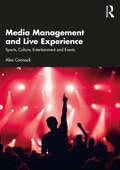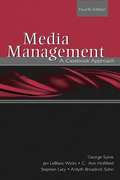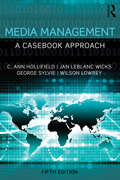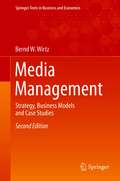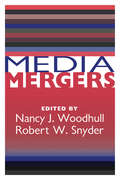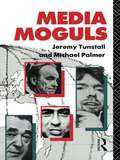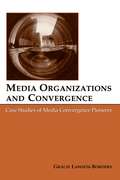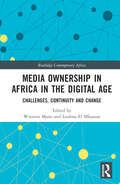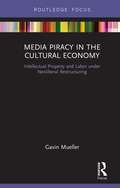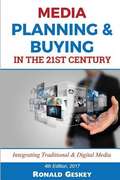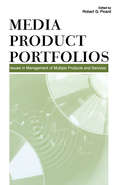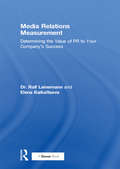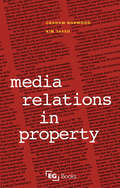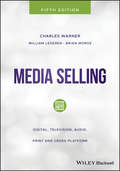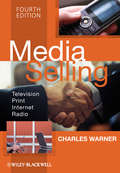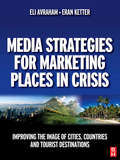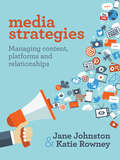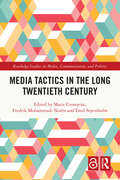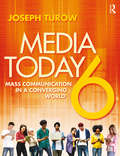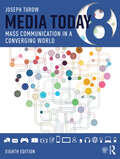- Table View
- List View
Media Management and Live Experience: Sports, Culture, Entertainment and Events
by Alex ConnockGlobal and authoritative, this textbook maps modern, live experience media, the categories that thrive on real-time engagement and human connection – even in the age of synthetic content, AI and the Metaverse. Sports and sports betting, festivals, comedy, concerts, tours and theme parks are covered – plus theatre, trade events, conventions, museums and galleries, and immersive media.Live media events included are Burning Man, Glastonbury, the Indian Premier League, the English Premier League, Olympics, NBA and Bundesliga – plus sell-out Taylor Swift tours, the World Cup, Super Bowl, Ryder Cup and Formula One. Business models in this media category start with ticketing and advertising – now amplified with ecommerce, affiliate marketing, subscription and gambling transactions. Deep dives ask: Why is Saudi Arabia investing billions into golf and football? Why is standup comedy big in Nigeria? How are Broadway and the West End evolving? What do immersive technologies like Abba Voyage and the MSG Sphere offer for the future?With class questions, a quiz, summaries and slides for each chapter, this is a guide and course structure for anyone at university level or in industry studying the media, music, entertainment, events, exhibitions, sports, social media or gambling industries.
Media Management: A Casebook Approach
by George Sylvie C. Ann Hollifield Leblanc Jan Wicks Stephen Lacy Broadrick Ardyth SohnMedia Management: A Casebook Approach provides a detailed look at the major areas of responsibility that fall to the managers of media organizations, including leadership, motivation, planning, marketing, and strategic management. It provides media-based cases that promote the development of critical thinking and problem-solving skills. Addressing such topics as diversity, group cultures, progressive discipline, training, and market-driven journalism, this casebook provides real-world scenarios that help students anticipate and prepare for experiences in their future careers. Among the additions to this fourth edition are Increased discussions on groups, vision, change, diversity, and management styles; Additional media-sensitive examples within each section of the text; A new chapter on knowledge management; Ethics integrated into law and leadership discussions; A primer in global markets, technology, and policy; In-depth consideration into the aspects of change; and Increased emphasis on analysis. This edition also includes management scenarios in which one or more participant is a new employee or intern, making the material relevant to students while also preparing them to understand the motivations of their future employers. Developed as a media management text for advanced undergraduates and graduate students, Media Management provides realistic scenarios and invaluable insights on working in the media industries.
Media Management: A Casebook Approach (Lea’s Communication Series)
by George Sylvie C. Ann Hollifield Wilson Lowrey Jan Leblanc WicksMedia Management: A Casebook Approach provides a detailed consideration of the manager's role in today's media organizations, highlighting critical skills and responsibilities. Using media-based cases that promote critical thinking and problem-solving, this text addresses topics of key concern to managers: diversity, group cultures, progressive discipline, training, and market-driven journalism, among others. The cases provide real-world scenarios to help students anticipate and prepare for experiences in their future careers. Accounting for major changes in the media landscape that have affected every media industry, this Fifth Edition actively engages these changes in both discussion and cases. The text considers the need for managers to constantly adapt, obtain quality information, and be entrepreneurial and flexible in the face of new situations and technologies that cannot be predicted and change rapidly in national and international settings. As a resource for students and young professionals working in media industries, Media Management offers essential insights and guidance for succeeding in contemporary media management roles.
Media Management: Strategy, Business Models and Case Studies (Springer Texts in Business and Economics)
by Bernd W. Wirtz“Digitalization significantly changes the media. To cope with this change and to exploit new market opportunities is a major challenge for media corporations. Bernd Wirtz provides a valuable guideline for this new world, combining theory, facts, and practice.” Dr. Hubert Burda, German publisher and Managing Corporate Partner of Hubert Burda Media Holding KG “The media business is subject to substantial change while differences between distinctive media areas are fading away. This is due to technical innovation in areas like transmittance of content, bearer of content and recording devices but also due to new formats, trends and constant change of consumer behavior.” The textbook “Media and Internet Management” stays abreast of changes and covers this topic on a well-founded and comprehensive basis. It makes a valuable contribution to theory and practice in media management and is highly recommendable to media managers.” Christoph Mohn, Chairman of the Supervisory Board, Bertelsmann AG “The world of media is full of challenges and dynamic conditions for its field. The dynamic of this market is accelerated even more by new digital technologies and ongoing globalization. This book is an absolute “must have” for everyone who wants to know more about the basics, conditions and requirements of modern media management. The analytical clearness and structure make this publication highly relevant for students, but also for managers.” Urs Rohner, Chairman of the Board of Directors, Credit Suisse Group AG “Media Management is a textbook, but a very welcome newcomer for students and teachers as it fills a market gap for good educational material in this rapidly evolving field. It is concise, simple (but not simplistic), and contains a contemporary overview of concepts and tools for media managers. ” Prof. Dr. Bozena I. Mierzejewska, Editor of The International Journal on Media Management, Fordham University, New York “Summed up, with his second edition Wirtz managed to strengthen the outstanding position of his publication “Media Management”. His textbook shines because of its content, analytical clearness and the high relevance for business practice without losing its academic background. With the second edition this book has established its position in the field of media business as the leading standard reference book in Germany. It is suitable for business students, lectures as well as managers who can gain magnificent information from it.” Prof. Dr. Wolfgang Fritz, Director of the Institute of Marketing, Braunschweig University of Technology, Germany; Honorary Professor at the Institute of Business Administration, University of Vienna, Austria.
Media Markets Down South: Goldman Sachs' Investment in Grupo Clar n
by Rafael Di Tella Jose Liberti Sarah McAraFounded in 1945, Grupo Clar n expanded over several decades to become Argentina's largest media conglomerate. With leading positions in newspapers, broadcast television, broadcast radio, cable television, and Internet services, Grupo Clar n caught the attention of U.S.-based investment bank Goldman Sachs, which acquired an 18% share of Grupo Clar n for US$500 million in 1999. While Grupo Clar n struggled during the economic crisis from 2001 to 2002, it was well positioned to grow as the economy began to recover in 2003, in part due to government policies that helped stabilize the media industry. Now in October 2007, Grupo Clar n was preparing to make an IPO in London and Buenos Aires, and fund managers at Goldman Sachs were reevaluating their position. What price would the IPO reach and how much, if any, of their stake should they sell? What was the return Goldman Sachs would obtain if they sold its entire position, or just one part?
Media Markets Down South: Goldman Sachs' Investment in Grupo Clar n
by Rafael Di Tella Jose Liberti Sarah McAraFounded in 1945, Grupo Clar n expanded over several decades to become Argentina's largest media conglomerate. With leading positions in newspapers, broadcast television, broadcast radio, cable television, and Internet services, Grupo Clar n caught the attention of U.S.-based investment bank Goldman Sachs, which acquired an 18% share of Grupo Clar n for US$500 million in 1999. While Grupo Clar n struggled during the economic crisis from 2001 to 2002, it was well positioned to grow as the economy began to recover in 2003, in part due to government policies that helped stabilize the media industry. Now in October 2007, Grupo Clar n was preparing to make an IPO in London and Buenos Aires, and fund managers at Goldman Sachs were reevaluating their position. What price would the IPO reach and how much, if any, of their stake should they sell? What was the return Goldman Sachs would obtain if they sold its entire position, or just one part?
Media Mergers
by Nancy J. Woodhull Robert W SnyderThe recent surge in media mergers has set off a wave of stories that all hit very close to home. In some cases, the news organizations themselves become news. The formation of communication conglomerates raises profound questions for reporters' lives and work, such as: What is the best way to cover stories of high profile and complexity? Will the new giants broaden both the definition of journalism and the opportunities for journalists to practice their craft? What are the prospects for the new partnership of big news, new media, and big business? The consequences of consolidation vary by media industry. The evolution of communication technology is so fast that today's truisms can be undone tomorrow. Media Mergers provides a healthy dose of skepticism, a search for illuminating facts, and a willingness to consider all sides of the discussion.This book approaches the emergence of media giants from a variety of angles. The contributors offer many ways of understanding their scale and their significance. Media Mergers is divided into six parts: "Point/Counterpoint," "The Imperial Moment," "Captains of Communication," "States of Media," "The Consequences of Media Empires in the United States," and "The Consequences of Media Empires Around the World." Authors include: Todd Gitlin; Steven Rattner; Ken Auletta; Madeline Rogers; Danny Schechter; Barbara Maltby; and Mac Margolis.Included in this volume is a roundtable introduced by Walter Cronkite and moderated by Alex Jones. Participants are Frank A. Bennack, Jr., Neil S. Braun, P. Anthony Ridder, and Arthur Ochs Sulzberger, Jr. A review essay by Anne Wells Branscomb concludes book. She discusses various books on the subjects of media moguls, multimedia conglomerates, and media takeovers. Media Mergers is especially pertinent today, an age in which the communications industry is constantly changing, progressing, and being affected by business upheavals. It will be of interest to publishers, media specialists, and all those in communications, policy and research.
Media Moguls (Communication and Society)
by Michael Palmer Jeremy TunstallThe emergence of a few powerful individuals in control of large sections of mass communication industries has coincided with world-wide media de-regulation. In the first book to take a close look at media moguls as a species, Jeremy Tunstall and Michael Palmer show how a handful of own-and-operate entrepreneurs run their empires with a highly eccentric and highly political management style. Individuals such as Berlusconi, Hersant, and Murdoch, in France, Germany, Italy, Britain and the US, are considered in the context of the changing European media industry. The book considers other, non-mogul trends: the emergence of a European media policy and a European-US-Japanese world media industry. Additional case studies focus on Reuters as a news-and-data super-agency and the part played by advertising and other media lobbies in shaping media policy.
Media Organizations and Convergence: Case Studies of Media Convergence Pioneers (Routledge Communication Series)
by Gracie L. Lawson-BordersThis volume offers a timely examination of technology's impact on media companies and the results of convergence among media industries, considering the effects on journalistic, business, and economic practices. Media Organizations and Convergence: Case Studies of Media Convergence Pioneers considers the many definitions of convergence and explores the changes in communication technologies. Author Gracie L. Lawson-Borders provides a brief history of media segments and their evolutions as they adapt to emerging technologies, media conglomeration, and the competitive and global changes that have occurred in the industry. She also examines the theoretical implications of technology and convergence in the operations and practices of media organizations.The case studies included here profile three media convergence pioneers--Tribune Company in Chicago, Media General in Richmond, and Belo Corporation in Dallas--that have incorporated convergence into their journalistic practices. Lawson-Borders considers the social, cultural, and political implications of convergence, and presents issues and concerns for the future of convergence in the media industry.As a snapshot of media convergence at the current stage in its evolution, this book offers important insights into the business of media at a time of dramatic change. It will be a valuable resource for scholars and students in media management, mass media, and related areas of the media industry.
Media Ownership in Africa in the Digital Age: Challenges, Continuity and Change (Routledge Contemporary Africa)
by Winston Mano Loubna El MkaouarWho owns the media and communications in Africa today and with what implications? The book elegantly answers this urgent question by unpacking multiple dimensions of media ownership through rare and authoritative perspectives, including both historical and contemporary digital developments. It traces the evolving forms of ownership of media and communications in specific African contexts, showing how they interact with broader changes in and outside the continent. The book also shows how Big Techs, such as Meta (formerly known as Facebook), are involved in a scramble for Africa’s digital ecosystem and how their advance brings both opportunities and concerns about ownership and control. The chapters analyse evolving forms of ownership and their implications on media concentration and democracy across Africa. The book offers a nuanced account of how media ownership structures are in some instances captured with an ever-growing and complex ecosystem that also has new opportunities for public interest media. Offering a significant representation of the trends and diversity of existing media systems, the book goes beyond the postcolonial geographical divisions of North and Sub-Saharan Africa to highlight common patterns and significant similarities and differences of communications ownerships between and within African countries. The contributors expose media and communications ownership patterns in Africa that are centralised and yet decentralising and in some cases, battling, resurging and globalising.
Media Piracy in the Cultural Economy: Intellectual Property and Labor Under Neoliberal Restructuring (Routledge Focus on Digital Media and Culture)
by Gavin MuellerThis book takes a Marxist approach to the study of media piracy – the production, distribution, and consumption of media texts in violation of intellectual property laws – to examine its place as an endemic feature of the cultural economy since the rise of the Internet. The author explores media piracy not in terms of its moral or legal failings, or as the inevitable by-product of digital technologies, but as a symptom of a much larger restructuring of cultural labor in the era of the Internet: labor that is digital, entrepreneurial, informal, and even illegal, and increasingly politicized. Sketching the contours of this new political economy while engaging with theories of digital media, both critical and celebratory, Mueller reveals piracy as a submerged social history of the digital world, and potentially the key to its political reimagining. This significant contribution to the study of piracy and digital culture will be vital reading for scholars and students of critical media studies, cultural studies, political theory, or digital humanities, and particularly those researching media piracy, digital labor, the digital economy, and Marxist theory.
Media Planning And Buying in the 21st Century: Integrating Traditional And Digital Media
by Ronald GeskeyUPDATED (4th) EDITION of the most up to date and comprehensive book on media panning and buying in the 21st century. In addition to extensive updating, includes brand new chapters on Internet and programmatic buying.
Media Policy - What Media Policy?
by Sandi SonnenfeldEvery year since 1982, Naturewise Apparel has donated $400,000 to charity through its Corporate Giving Fund. This year, Dana Osborne, the founder and CEO of the children's clothing manufacturer, decided to allow each of the company's regional divisions to decide for itself where the money should go. Her goal was to include all employees in the program and to pay back the various local communities that support the company. Dana's good intentions backfired, however, when an abortion clinic in Illinois was bombed and the bomber claimed affiliation with a radically pro-life group called TermRights. Naturewise's Midwest division had inadvertently provided donations to TermRights through a nonprofit umbrella corporation called CHICARE. How should Dana handle the media? Five experts consider this fictitious scenario and give advice on forming an effective media policy.
Media Product Portfolios: Issues in Management of Multiple Products and Services
by Robert G. PicardMedia product portfolios are rapidly becoming the predominant shared characteristic of media companies worldwide. The phenomenon involves firms from all kinds of media--newspapers, magazines, television, radio, cinema--and is found in enterprises ranging from small, local firms to large, globalized companies. This volume is the result of a coordinated effort of scholars in the United States and Europe to explore the characteristics, processes, challenges, and implications of media product portfolios.This book breaks new ground by introducing the concepts of product portfolio management and applying them to media companies in a comprehensive manner. It draws from knowledge and methods of analyzing product portfolio management in other industries, applies that knowledge to media industries, and analyzes current practices in media firms. The process and issues of portfolio strategy, development, and management are complex and wide ranging. The book explores the development of media product portfolios from an interdisciplinary perspective, providing insight from business, economic, organizational, and communication approaches. The book explores why and how firms develop portfolios, how company strategy and organizational development relate to portfolios, the role of leaders in developing portfolio activities, economic and economic geography issues in portfolios, production issues, challenges in managing multiple products and operations, issues of marketing and branding issues in portfolios, personnel implications, and the unique challenges in the internationalization of media portfolio operations.
Media Relations Measurement: Determining the Value of PR to Your Company's Success
by Ralf Leinemann Elena BaikaltsevaNowadays most managers seek a complete picture when it comes to return on investment and this applies to PR too. Despite this, and the developments in measurement tools for marketing and advertising, PR has lagged behind and different professionals have favoured different models. Ralf Leinemann and Elena Baikaltseva's book brings together the range of models for evaluating PR effectiveness and develops them into a series of appropriate tools for business use. Basic concepts such as balanced scorecards, business fundamentals and planning processes are all covered. The authors also introduce their own theory of PR evaluation and apply it to five different types of activity: interviews, press conferences, generic campaigns, crisis PR and long-term projects. In addition, the book contains many valuable tips and real-life examples throughout. Written for corporate PR practitioners and marketing/communications specialists, this book brings together business objectives and the evaluation of company impact in terms of media, reputation, visibility of the company and its competitors. In total, more than 60 different methods of evaluation are discussed, providing readers with an indispensable toolkit for mapping each PR task or project by selecting the appropriate method from the menu provided.
Media Relations in Property
by Kim Tasso Graham NorwoodMedia relations are a vital tool for helping property companies build shareholder value through stronger brands, develop reputations that drive a flow of new work, and help sell and let properties faster and at a fraction of the cost of other marketing techniques, but such relationships need to be managed properly. This practical and comprehensive book – peppered with real case studies and observations from numerous people within the property industry – aims to demystify ‘the black art of PR’. Some of the topics covered include: the strategic aims and benefits of good media relations promoting good media relations practice throughout your organization an overview of property opportunities across the UK media understanding journalists and what they want do's and don'ts of working with the media developing a media relations plan the costs of media relations programmes. Written by an award winning property journalist and a marketing consultant with more than forty years experience between them, this book is a must read for all property professionals looking to make the most out of the media.
Media Representations of Anti-Austerity Protests in the EU: Grievances, Identities and Agency (Routledge Research in Cultural and Media Studies)
by Suman Gupta Tao PapaioannouThis book analyzes constructions of injustice, group identification and participation in news and social media in anti-austerity protests within the European Union (EU). Since 2008, EU member-states have witnessed waves of protests and demonstrations against the adoption of austerity measures and alignment of domestic economies with the prevailing global neoliberal order. Understanding how the media represents dissent and how it influences public deliberation is of critical importance. It is accordingly necessary to explore the strategies deployed and role played by news and social media in representing and perhaps acting upon anti-austerity protests in the Eurozone crisis. This volume undertakes such a critical exploration.
Media Selling: Digital, Television, Audio, Print and Cross-Platform (Wiley Desktop Editions Ser.)
by Charles Warner William Lederer Brian MorozThe must-have resource for media selling in today’s technology-driven environment The revised and updated fifth edition of Media Selling is an essential guide to our technology-driven, programmatic, micro-targeted, mobile, multi-channel media ecosystem. Today, digital advertising has surpassed television as the number-one ad investment platform, and Google and Facebook dominate the digital advertising marketplace. The authors highlight the new sales processes and approaches that will give media salespeople a leg up on the competition in our post-Internet media era. The book explores the automated programmatic buying and selling of digital ad inventory that is disrupting both media buyers and media salespeople. In addition to information on disruptive technologies in media sales, the book explores sales ethics, communication theory and listening, emotional intelligence, creating value, the principles of persuasion, sales stage management guides, and sample in-person, phone, and email sales scripts. Media Selling offers media sellers a customer-first and problem-solving sales approach. The updated fifth edition: Contains insight from digital experts into how 82.5% of digital ad inventory is bought and sold programmatically Reveals how to conduct research on Google Analytics Identifies how media salespeople can offer cross-platform and multi-channel solutions to prospects’ advertising and marketing challenge Includes insights into selling and distribution of podcasts Includes links to downloadable case studies, presentations, and planners on the Media Selling website Includes an extensive Glossary of Digital Advertising terms Written for students in communications, radio-TV, and mass communication, Media Selling is the classic work in the field. The updated edition provides an indispensable tool for learning, training, and mastering sales techniques for digital media.
Media Selling: Television, Print, Internet, Radio
by Charles WarnerThis newly revised and updated edition of Media Selling addresses the significant changes that have taken place in media industries over the last few years, while continuing as a seminal resource for information on media sales. A classic in this field, this book has long served students and professionals in broadcasting and media industries as an indispensable tool for learning, training, and mastering sales techniques for electronic media Addresses the unprecedented consolidation and sweeping change faced by media industries in recent years, and now features greatly expanded coverage of the Internet, including video streaming and the impact of social network sites Covers a broad span of media industries and issues, including: electronic media, newspapers, magazines, outdoor/billboard promotion, sales ethics, emotional intelligence, and interactive media selling Fully updated to include much greater focus on national and international media sales issues, as well as expanded coverage of network-level selling, product placement, sales promotion use of market data
Media Strategies for Marketing Places in Crisis
by Eli Avraham Eran KetterGrowing competition between countries and cities over attracting infrastructure, investment, tourists, capital and national and international status mean that today, a negative image is more harmful than ever. Whatever the cause of the negative image, places perceived as dangerous, frightening, or boring are at a distinct disadvantage. Many decision makers and marketers stand by helplessly, frustrated by their knowledge that in most cases, their city's negative image is not based on well-grounded facts. Given that stereotypes are not easily changed or dismissed, the challenge facing these decision makers is great. Analyses of many case studies show interesting examples of places that tried to change a negative image into a positive one, in order to bringing back tourists, investors and residents. Although a great deal of knowledge about crisis communications has accumulated in recent years, very little has been written about strategies to improve places' negative images. The aim of "Media Strategies for Marketing Places in Crisis" is to discuss the various dimensions of an image crisis and different strategies to overcome it, both in practice and theory. "Media Strategies for Marketing Places in Crisis" is based on the careful analysis of dozens of case studies, advertisements, public relations campaigns, press releases, academic articles, news articles, and the websites of cities, countries and tourist destinations.
Media Strategies: Managing content, platforms and relationships
by Jane Johnston Katie RowneyMedia Strategies maps the complex and disruptive media environment for the communication professional and provides the tools and methods to work effectively within it. Increasingly, communication professionals need to be accomplished content managers, capable of employing an arsenal of multi-media tactics across different platforms. This book presents new and innovative approaches to media relations, brand journalism and content management, providing practitioners with the tools to creatively develop, share and deliver strategic media assets and ideas that cut through the cluttered digital environment. The authors also demonstrate that personal and traditional skills are as important as ever, including the ability to tell stories, create memorable media pitches, write and lay-out media materials, and develop credibility and trust in relationships. Media Strategies sets a new agenda for anyone seeking to build a career as a professional communicator. It includes examples from around the world, from corporate, political, government, not-for-profit and activist communication and public relations practice.'The game has changed. Communications professionals should look to this as their guide when navigating a swiftly changing media landscape.' Ross Healy, Brand Social Media Specialist 'Media Strategies cuts through the hype to show how you can build your skills and excel as a communicator in both traditional media and the disruptive digital media platforms.' Elissa Trezia, Financial Technology PR Executive, Indonesia 'An excellent guide to the complex media landscape.' Catherine Archer, Academic Chair, Strategic Communication, Murdoch University
Media Tactics in the Long Twentieth Century (Routledge Studies in Media, Communication, and Politics)
by Marie Cronqvist Emil Stjernholm Fredrik Mohammadi NorénIntegrating media studies with history, Media Tactics in the Long Twentieth Century explores the dynamic relationship between tactics and strategies in recent history.Drawing on examples from a range of different countries and world regions, and looking at the infrastructures, entanglements, and institutions involved, the volume makes a strong case for media tactics as a new field of scholarly inquiry and for the importance of a historically informed approach. In contrast to strategic communication approaches, this media historical intervention contributes to new knowledge about the practical implementation of strategies. First foregrounding tactics as an object of study, the volume then counters the presentism of contemporary studies by adding a necessary historical perspective. Moreover, the book theoretically disentangles the concept of strategy – from an abstract contemporary buzzword to concrete, hands-on actions – which in turn reveals the complexity of using media strategies and media tactics in reality.This volume will interest scholars and students working in the field of media and communication in general, and in the subfields of strategic communication, public relations, media history, and propaganda studies.The Open Access version of this book, available at http://www.taylorfrancis.com, has been made available under a Creative Commons [Attribution-Non Commercial-No Derivatives (CC-BY-NC-ND)] 4.0 license.
Media Today
by Joseph Turow"Turow's Media Today: Mass Communication in a Converging World, now in its fifth edition, chooses [a] cutting-edge option. This is a student-friendly publication, offering aids such as definitions of key terms, colourful infographics, case studies and end-of-chapter review questions. There's a companion website, too, and a password-protected website for instructors."--Philip Kemp, Times Higher Education Media Today uses convergence as a lens that puts students at the center of the profound changes in the 21st century media world. Through the convergence lens they learn to think critically about the role of media today and what these changes mean for their lives presently and in the future. The book's media systems approach helps students to look carefully at how media is created, distributed, and exhibited in the new world that the digital revolution has created. In this way, Media Today goes beyond the traditional mass communication textbook's focus on consuming media, to give students an insider's perspective on how media businesses operate. How exactly does Google profit from web searches? What will a magazine look like five years from now? Informative and engaging, Media Today, Fifth Edition, is characterized by its focus on: Convergence: In addition to separate chapters on the Internet and the Video Games industry, coverage of convergence and its impact is incorporated into every chapter. Consumer Education: Media Literacy questions ask students to consider their roles as a media consumer and potential media creator. Comprehensive Media Industry Coverage: Historical timelines in the print book and on the companion website track the development of each media industry, giving students an overview of a particular industry at a glance. Contemporary, Student-friendly Examples: New culture and media boxes help students think about the impact of media industries on their own lives and globally. Joseph Turow--who has been teaching Intro to Mass Communication for well over a decade--demonstrates the many ways that media convergence and the pervasiveness of the Internet have blurred distinctions between and among various media. From newspapers to video games or social networking to mobile platforms, Media Today prepares students to live in the digital world of media.
Media Today: Mass Communication in a Converging World
by Joseph TurowMedia Today uses convergence as a lens that puts students at the center of the profound changes in the 21st century media world. Through the convergence lens they learn to think critically about the role of media today and what these changes mean for their lives presently and in the future. The book’s media systems approach helps students to look carefully at how media content is created, distributed, and exhibited in the new world that the digital revolution has created. From newspapers to video games and social networking to mobile platforms, Media Today prepares students to live in the digital world of media.
Media Today: Mass Communication in a Converging World
by Joseph TurowThis eighth edition of Joseph Turow’s pathbreaking media textbook uses convergence as a lens that puts students at the center of the profound changes in the 21st century media world. It teaches students to think critically about the role of media, and what these changes mean for their lives. The book’s media systems approach helps students to look carefully at how media content is created, distributed, and exhibited in the new world that the digital revolution has created. From news media to video games and social networking to mobile platforms, it provides students with the tools they need to understand and critique the media they encounter and consume. The first part examines the media world as a whole, while the second delves deep into key media industries, such as the movie, television, and video game industries. This new edition includes critical expanded coverage of social media, new forms of both audio and audiovisual media and international case studies, as well as updated figures, tables, and pedagogy, including key terms and further activities. Media Today is an excellent introduction to the world of media in the digital age, perfect for students seeking a solid grounding in media studies. Extensive pedagogical materials also make this a highly teachable book, well suited to the classroom. The accompanying website has also been updated with new student and instructor resources, including chapter recaps, recommended readings, and instructor’s manual.
